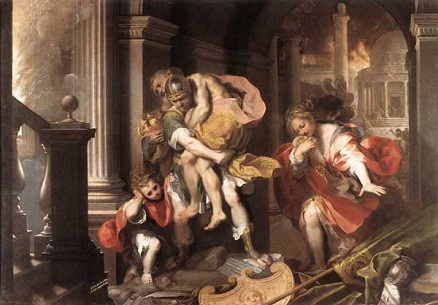
The Rectory School
Notion of the Epic Hero
|
Aeneas Flees Burning Troy, Federico Barocci, 1598 Aeneas Aeneas was the eponymous hero of Vergil’s Aeneid. The son of Anchises and Venus, he was a famous Trojan warrior. After his crushing defeat at the hands of Diomedes, Aeneas recovers in Troy, thus being in the city when the Greeks breach the walls with the Trojan horse. He was forced to flee the conflagration, through which he led his son Ascanius and carried his father Anchises. Once they reach the safety of the city’s outskirts, they realized that they were separated from his wife Creusa. He tries to go back and find her, but is stopped by her larger than life image telling him to flee. Obeying her wishes, he escaped out to sea with the other Trojan refugees. After a long time of wandering, they happened upon Carthage on the northern coast of Africa. There they were taken in and sheltered by Queen Dido and her people. As time went one (and with a little help from Cupid), Dido and Aeneas fell in love. After wintering in Carthage, however, Juppiter was displeased with Aeneas’ delay. He sent Mercury to urge Aeneas on his way. Understanding that he could not defy the gods, Aeneas left quickly and quietly, not telling Dido the reason for his sudden departure. As he sailed away, she committed suicide on a funeral pyre, ostensibly lit to show Aeneas the way back to Carthage. After further travels, Aeneas entered the Underworld to beseech advice from Teiresias. While seeking the blind seer, he came across the shade of Dido. Shocked and dismayed, Aeneas falls to his knees, apologizing for leaving amidst his tears. The late queen ignores the blubbering hero and continues on with her first husband. Towards the end of his journey, he arrives in Latium. There he wins the heart of the princess, who happened to be betrothed to Turnus, an Etruscan warrior. Aeneas enters into a final battle with Turnus and kills the warrior in a scene that starkly resembles Achilles and Hector’s final duel. Readings: Aeneid Books One, Two, Four, Six, Eleven |
This site was created by Gregory Kakas at the NEH Summer Institute "Literatures, Religions, and Arts of the Himalayan Region," held at the College of the Holy Cross, Summer 2011.

